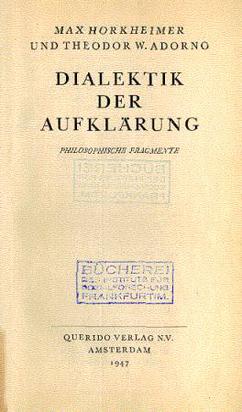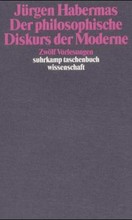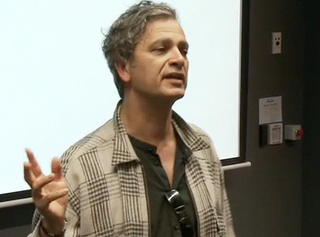The following outline is provided as an overview of and topical guide to critical theory:

Jürgen Habermas is a German philosopher and social theorist in the tradition of critical theory and pragmatism. His work addresses communicative rationality and the public sphere.

Max Horkheimer was a German philosopher and sociologist who was famous for his work in critical theory as a member of the Frankfurt School of social research. Horkheimer addressed authoritarianism, militarism, economic disruption, environmental crisis, and the poverty of mass culture using the philosophy of history as a framework. This became the foundation of critical theory. His most important works include Eclipse of Reason (1947), Between Philosophy and Social Science (1930–1938) and, in collaboration with Theodor Adorno, Dialectic of Enlightenment (1947). Through the Frankfurt School, Horkheimer planned, supported and made other significant works possible.

The Frankfurt School is a school of thought in sociology and critical philosophy. It is associated with the Institute for Social Research founded at Goethe University Frankfurt in 1923. Formed during the Weimar Republic during the European interwar period, the first generation of the Frankfurt School was composed of intellectuals, academics, and political dissidents dissatisfied with the socio-economic systems of the 1930s: namely, capitalism, fascism, and communism. Significant figures associated with the school include Max Horkheimer, Theodor Adorno, Walter Benjamin, Wilhelm Reich, Herbert Marcuse, and Jürgen Habermas.
Social philosophy is the study and interpretation of society and social institutions in terms of ethical values rather than empirical relations. Social philosophers emphasize understanding the social contexts for political, legal, moral and cultural questions, and the development of novel theoretical frameworks, from social ontology to care ethics to cosmopolitan theories of democracy, natural law, human rights, gender equity and global justice.
A consensus theory of truth is the process of taking statements to be true simply because people generally agree upon them.
Universal pragmatics (UP), more recently placed under the heading of formal pragmatics, is the philosophical study of the necessary conditions for reaching an understanding through communication. The philosopher Jürgen Habermas coined the term in his essay "What is Universal Pragmatics?" where he suggests that human competition, conflict, and strategic action are attempts to achieve understanding that have failed because of modal confusions. The implication is that coming to terms with how people understand or misunderstand one another could lead to a reduction of social conflict.

Oskar Reinhard Negt was a German philosopher and critical social theorist. He was a professor of sociology in Hanover from 1972 to 2002, regarded as one of Germany's most prominent social scientists.

Dialectic of Enlightenment is a work of philosophy and social criticism written by Frankfurt School philosophers Max Horkheimer and Theodor W. Adorno. The text, published in 1947, is a revised version of what the authors originally had circulated among friends and colleagues in 1944 under the title of Philosophical Fragments.

Axel Honneth is a German philosopher who is the Professor for Social Philosophy at Goethe University Frankfurt and the Jack B. Weinstein Professor of the Humanities in the department of philosophy at Columbia University. He was also director of the Institut für Sozialforschung in Frankfurt am Main, Germany between 2001 and 2018.

The Structural Transformation of the Public Sphere: An Inquiry into a Category of Bourgeois Society is a 1962 book by the philosopher Jürgen Habermas. It was translated into English in 1989 by Thomas Burger and Frederick Lawrence. An important contribution to modern understanding of democracy, it is notable for "transforming media studies into a hard-headed discipline." In 2022 Habermas published a brief sequel, A New Structural Transformation of the Public Sphere and Deliberative Politics.
In sociology, communicative action is cooperative action undertaken by individuals based upon mutual deliberation and argumentation. The term was developed by German philosopher-sociologist Jürgen Habermas in his work The Theory of Communicative Action.
The positivism dispute was a political-philosophical dispute between the critical rationalists and the Frankfurt School in 1961, about the methodology of the social sciences. It grew into a broad discussion within German sociology from 1961 to 1969. The naming itself is controversial, since it was the Frankfurt School proponents who accused the critical rationalists of being positivists—while the latter considered themselves to be opponents of positivism.

The Theory of Communicative Action is a two-volume 1981 book by the philosopher Jürgen Habermas, in which the author continues his project of finding a way to ground "the social sciences in a theory of language", which had been set out in On the Logic of the Social Sciences (1967). The two volumes are Reason and the Rationalization of Society, in which Habermas establishes a concept of communicative rationality, and Lifeworld and System: A Critique of Functionalist Reason, in which Habermas creates the two level concept of society and lays out the critical theory for modernity.

The Philosophical Discourse of Modernity: Twelve Lectures is a 1985 book by the philosopher Jürgen Habermas, in which the author reconstructs and deals in depth with a number of philosophical approaches to the critique of modern reason and the Enlightenment "project" since Georg Wilhelm Friedrich Hegel and Friedrich Nietzsche, including the work of 20th century philosophers Max Horkheimer, Theodor Adorno, Martin Heidegger, Michel Foucault, Jacques Derrida, Cornelius Castoriadis and Niklas Luhmann. The work is regarded as an important contribution to Frankfurt School critical theory. It has been characterized as a critical evaluation of the concept of world disclosure in modern philosophy.

Nikolas Kompridis is a Canadian philosopher and political theorist. His major published work addresses the direction and orientation of Frankfurt School critical theory; the legacy of philosophical romanticism; and the aesthetic dimension(s) of politics. His writing touches on a variety of issues in social and political thought, aesthetics, and the philosophy of culture, often in terms of re-worked concepts of receptivity and world disclosure—a paradigm he calls "reflective disclosure".
Peter Eli Gordon is an American historian of philosophy, a critical theorist, and intellectual historian. The Amabel B. James Professor of History and Faculty Affiliate in the Department of Philosophy at Harvard University, Gordon focuses on continental philosophy and modern German and French thought, with particular emphasis on the German philosophers Theodor Adorno and Martin Heidegger, critical theory, continental philosophy during the interwar crisis, and most recently, secularization and social thought in the 20th century.

A critical theory is any approach to humanities and social philosophy that focuses on society and culture to attempt to reveal, critique, and challenge or dismantle power structures. With roots in sociology and literary criticism, it argues that social problems stem more from social structures and cultural assumptions than from individuals. Some hold it to be an ideology, others argue that ideology is the principal obstacle to human liberation. Critical theory finds applications in various fields of study, including psychoanalysis, film theory, literary theory, cultural studies, history, communication theory, philosophy, and feminist theory.

Marxist cultural analysis is a form of cultural analysis and anti-capitalist cultural critique, which assumes the theory of cultural hegemony and from this specifically targets those aspects of culture that are profit driven and mass-produced under capitalism.









